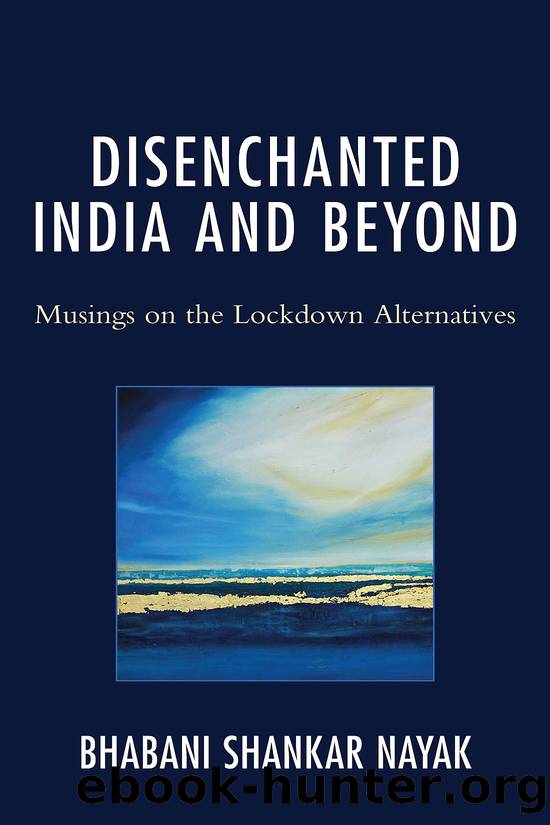Disenchanted India and Beyond by Bhabani Shankar Nayak

Author:Bhabani Shankar Nayak
Language: eng
Format: epub
ISBN: 9781793642806
Publisher: Lexington Books
Chapter 5
Culture, Crime and Capitalism
In the world of ideology-free zone of politics, the question âof morality and immorality in popular and mainstream political traditionsâ is becoming irrelevant. The incompetent governments, helpless states, visionless leadership, directionless politics, weak judiciaries and compliant media organisations are the net output of amoral and illiberal politics. The moral critique of political system does not yield any electoral dividends for radical politics within democratic system. Irrespective of ideological formations, the political system is designed in such a way that exploits people and stands with the capitalists and upholds the interests of the propertied class through corrupt means. It looks as if there is a clear bifurcation between politics and morality in praxis. The moralistic cults based on hard work, honesty, sobriety, sexual propriety, thrift, nonviolence, truth and other Gandhian, Ambedkarite, Marxist, Mandelian and Martin Luther Kingâs shared and collective values in politics are becoming obsolete and considered to be liabilities in politics.
The deepening of moral crisis in politics is an extension of utilitarian values incorporated in the society during early industrial revolution and patronised during managerialist-led market revolution during twentieth and twenty-first centuries. The moral dumbfounding cultural effect in politics is further accelerated by the growth of fictitious online social, economic and cultural life in the age of information technology. It ensures mass melancholy of the obsolete and immoral self-serving politics of brutal capitalism, which hides behind democracy and individual freedom. It does not guide people and society towards peace, progress and prosperity due to its immoral political landscape. The immoral politics is based on illiberal ideas and practice, which divides the society and people on moral questions. In 2012, psychologist Jonathan Haidt has published his book The Righteous Mind: Why Good People Are Divided by Religion and Politics. He has outlined moral foundations of politics based on ideals of care, fairness loyalty, authority, sanctity and liberty. According to Jonathan Haidt, these moral qualities are intuitive and integral to human beings. But in reality, there are collective material foundations, which help to develop these moral qualities in human beings. These qualities are products of everyday experiences of working classes in their workplace and their interactions with fellow workers that ensure these moral qualities in working population.
What are the political alternatives before the working-class masses? How to ensure morality in politics? The answers to these questions are complex but not difficult to answer.
It is time to bring back mass politics rooted in class, dedicated to class and led by working classes. The concept of class politics is no longer confined within organised industrial zones. The trade unions used to organise these workers in their workplaces. The trade unions and working-class people have played a major role in wage bargain movements in the workplace to anti-colonial and anti-capitalist struggles. The working classes have played a major role in democratisation of society and in enlarging individual liberty and citizenship rights. The working-class morality in politics has shaped morality both in radical and mainstream politics. The work and the workplaces
Download
This site does not store any files on its server. We only index and link to content provided by other sites. Please contact the content providers to delete copyright contents if any and email us, we'll remove relevant links or contents immediately.
| Africa | Americas |
| Arctic & Antarctica | Asia |
| Australia & Oceania | Europe |
| Middle East | Russia |
| United States | World |
| Ancient Civilizations | Military |
| Historical Study & Educational Resources |
The Story of China by Michael Wood(968)
Mr. Selden's Map of China by Timothy Brook(815)
Philippines--Culture Smart! by Culture Smart!(714)
Heroic Hindu Resistance To Muslim Invaders (636 AD to 1206 AD) by Sita Ram Goel(706)
First Platoon by Annie Jacobsen(679)
Akbar: The Great Mughal by Ira Mukhoty(675)
Vedic Physics: Scientific Origin of Hinduism by Raja Ram Mohan Roy(667)
Food of India by unknow(666)
The Meaning of India by Raja Rao(665)
Banaras by Diana L. Eck(657)
India--Culture Smart! by Becky Stephen(633)
North of South by Shiva Naipaul(632)
China Unbound by Joanna Chiu(631)
Mao's Great Famine: The History of China's Most Devastating Catastrophe, 1958-1962 by Frank Dikötter(623)
The Genius of China: 3,000 Years of Science, Discovery, and Invention by Robert Temple(602)
Insurgency and Counterinsurgency by Jeremy Black(598)
How to Be a Modern Samurai by Antony Cummins(591)
A History of Japan by R.H.P. Mason & J.G. Caiger(589)
The Digital Silk Road by Jonathan E. Hillman(584)
